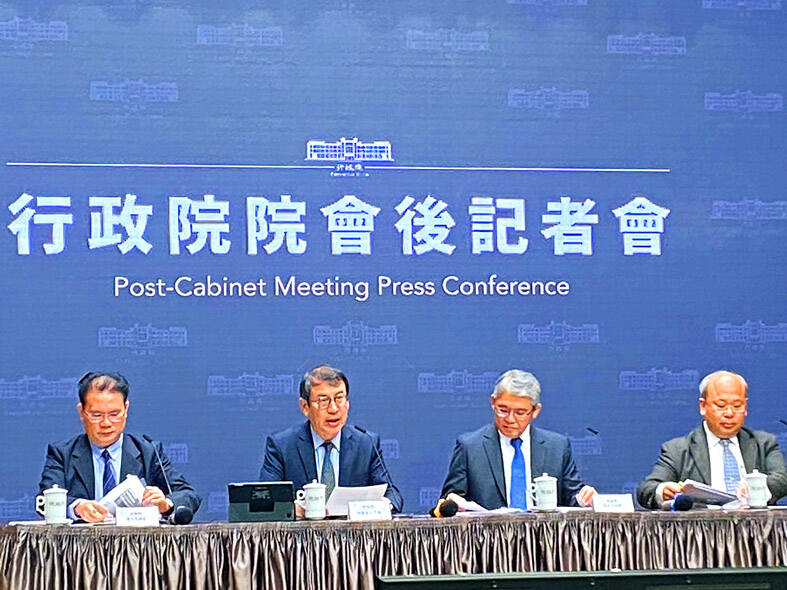Special municipalities should reserve 5 percent of land for social welfare housing projects, while other cities and counties should reserve 3 percent, according to a measure approved by the Executive Yuan yesterday.
Premier Chen Chien-jen (陳建仁) said that with the approval of the Measures to Promote Social Welfare Housing Policies and Increasing Usable Land for Housing Projects (推動社會住宅成果與提升社宅用地供給精進措施), the government aims to build 1 million social welfare housing units by 2031 and he had instructed the Ministry of the Interior to take charge of the policy.
Chen has also asked other ministries to work with the Ministry of the Interior on the measures, and has instructed the Ministry of the Interior to find legal bases to designate land exclusive for social welfare facilities.

Photo: Chung Li-hua, Taipei Times
Transit-oriented development and urban renewal projects should prioritize land or units reserved for social housing so the government’s goal of building social housing units can be met, the Ministry of the Interior said.
The government would also continue to offer its services to manage leases for landlords and use those houses as social housing, as well as its policies to provide subsidies for 500,000 individuals who are renting.
As of Nov. 30, the nation had built 91,189 social housing units — 46,732 units, or 51 percent, built by the central government and 44,457 units, or 49 percent, built by local governments — Minister of the Interior Lin You-chang (林右昌) said yesterday.
The number of units built by the central government had exceeded that built by local governments in just three years and the central government had built the units across the nation, including in outlying counties, he said.
He said that future construction projects by the central government would factor in actual living needs, the local population, industry development and distance to commute to work.
He said that the ministry is still inventorying public land nationwide and is planning to repurpose land that is not used to its full potential, including using old office buildings and shuttered schools for social housing projects.
Democratic Progressive Party presidential candidate Vice President William Lai (賴清德) had earlier pledged that if elected, he would see that the nation builds more than 1 million social housing units using various policies.
Over the past eight years, 200,000 social housing units have been added — 120,000 constructed by the government and 80,000 from government-sponsored leases, Lai said, adding that if elected, he would build an additional 130,000 units over the next eight years.
Lai said he also plans to expand government-sponsored leases to 170,000 units and increase the number of government subsidies to 500,000, which, on top of President Tsai Ing-wen’s (蔡英文) policy, would raise the total number of social housing units to 1 million.
Additional reporting by Hsu Yi-ping

Three Taiwanese airlines have prohibited passengers from packing Bluetooth earbuds and their charger cases in checked luggage. EVA Air and Uni Air said that Bluetooth earbuds and charger cases are categorized as portable electronic devices, which should be switched off if they are placed in checked luggage based on international aviation safety regulations. They must not be in standby or sleep mode. However, as charging would continue when earbuds are placed in the charger cases, which would contravene international aviation regulations, their cases must be carried as hand luggage, they said. Tigerair Taiwan said that earbud charger cases are equipped

Foreign travelers entering Taiwan on a short layover via Taiwan Taoyuan International Airport are receiving NT$600 gift vouchers from yesterday, the Tourism Administration said, adding that it hopes the incentive would boost tourism consumption at the airport. The program, which allows travelers holding non-Taiwan passports who enter the country during a layover of up to 24 hours to claim a voucher, aims to promote attractions at the airport, the agency said in a statement on Friday. To participate, travelers must sign up on the campaign Web site, the agency said. They can then present their passport and boarding pass for their connecting international

Temperatures in northern Taiwan are forecast to reach as high as 30°C today, as an ongoing northeasterly seasonal wind system weakens, the Central Weather Administration (CWA) said. CWA forecaster Tseng Chao-cheng (曾昭誠) said yesterday that with the seasonal wind system weakening, warmer easterly winds would boost the temperature today. Daytime temperatures in northern Taiwan and Yilan County are expected to range from 28°C to 30°C today, up about 3°C from yesterday, Tseng said. According to the CWA, temperature highs in central and southern Taiwan could stay stable. However, the weather is expected to turn cooler starting tonight as the northeasterly wind system strengthens again

Taiwan sweltered through its hottest October on record, the Central Weather Administration (CWA) said yesterday, the latest in a string of global temperature records. The main island endured its highest average temperature since 1950, CWA forecaster Liu Pei-teng said. Temperatures the world over have soared in recent years as human-induced climate change contributes to ever more erratic weather patterns. Taiwan’s average temperature was 27.381°C as of Thursday, Liu said. Liu said the average could slip 0.1°C by the end of yesterday, but it would still be higher than the previous record of 27.009°C in 2016. "The temperature only started lowering around Oct. 18 or 19